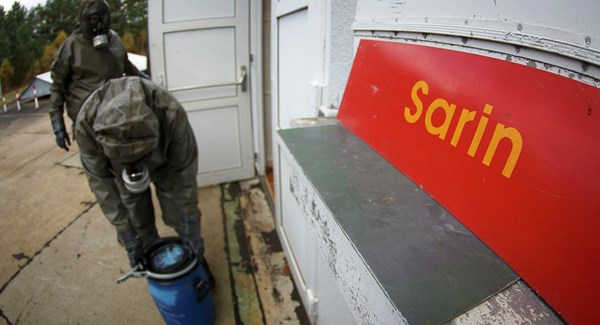Russia again stands up for Assad, asserts that the chemical attack in Syria was staged
Russia has presented a range of evidence to the Organization for the Prohibition of Chemical Weapons (OPCW) claiming that the incident of the possible use of poisonous gas in the Syrian province of Idlib has a staged character. TASS writes that Alexander Shulgin, the Permanent Representative of the Russian Federation to the organization, reported this.
According to Shulgin, a meeting of the OPCW Executive Council took place in The Hague, during which the floor was given in particular to Mikhail Ulyanov, the Director of the Department for Nonproliferation and Arms Control of the Russian Foreign Ministry.
"Learning that the Russian representative planned to accompany his speech with a photograph demonstration, the Western partners tried to prevent this," Shulgin noted. "Ultimately, however, Ulyanov was allowed to show photos from the scene of the incident."
According to him, the photos "pointed to the staged character of those videos that we saw on YouTube, filmed on the heels of the April 4 events. Judging by the photographs presented by Ulyanov, there are many inconsistencies in the articulated version regarding the use of chemical weapons. "
"It is stated, for example, that sarin was used, the strongest poisonous substance," he remarked. “Doctors know that as a result of the application of sarin, the pupils contract. Meanwhile, it can be seen in the photographs that the pupils of the children are enlarged. This is the first inconsistency. "
In addition, Shulgin said that the second inconsistency is "the nature of the hole in the ground, which was referred to by humanitarian organizations, illustrating their story about the crimes of the Syrian regime. "The hole is clearly not from an air bomb or missile, but rather suggests that an explosion of a small ammunition on the ground with the addition of some chemicals was organized."
"In a word, the staging of this incident is visible, and there is a legitimate question about an investigation," he added. "Consequently, our representative expressed the hope that his colleagues would be able to respond to the proposal of Russia and Iran for an urgent investigation."
According to the Russian Defense Ministry, on April 4 the Syrian air force bombed workshops in the province of Idlib, where militants produced ammunition with poisonous substances that were supplied to Iraq and used in Aleppo.
As a result of one of the largest gas attacks since the outbreak of the war in Syria, at least 100 people were killed; another 400 suffer from respiratory problems.
French Foreign Minister Jean-Marc Ayrault said that the French Special Services, in the coming days, would provide evidence that Syrian government troops organized a chemical weapons attack in the city of Khan-Sheikhun.
